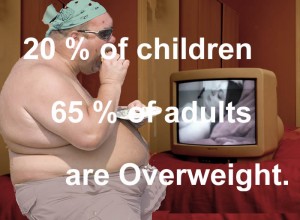The American economy took off following the end of World War II, fattening both our wallets and our waistlines. In this video, Academic Earth examines the post-war boom that busted our seams. Take a look at this article and video, submitted by Lisa Miller, a contributor to Academic Earth:
“American waistlines are expanding – this isn’t news. And really, the cause isn’t revelatory either – people expend fewer calories than they consume – simple math. We’ve been trending this way for the last sixty years, and for very good reason. The post-ware era ushered in suburban living and the techno-age of food. This relatively sedentary life of car-centric neighborhoods, television, and television dinners gave rise to the modern obesity epidemic.1
Following WWII, America saw a suburban construction boom. As men came home, ready to settle down and raise families, they hopped in their Chevrolets and left the overcrowded cities and isolated farming towns for comfortable living within a short commute to work.2 The suburbs were not designed for walking. The active lifestyles of city and farm living were sacrificed for the sprawling cinderblock landscapes of supermarkets and shopping malls.
The advent of processed, pre-packaged food coincided nicely with suburban living. Supermarkets boasted expansive aisles of neatly packaged, easy to prepare, high-calorie foods. Where families once locally sourced their food, production became centralized at large factories. Food was abundant, cheap, and non-perishable welcoming the opportunity to stock-up and indulge.
And here we are, mired in a cultural legacy left by post-war abundance. The question to ask ourselves is – how do we get out of this mess?”
Created by AcademicEarth.org
1 Cutler, David M., Edward L. Glaeser, and Jesse M. Shapiro. “Why Have Americans Become More Obese?“ Journal of Economic Perspectives 17.3 (2003): 93-118.Chicagobooth.edu. The University of Chicago Booth School of Business. Web. 1 May 2013.
2 Galyean, Crystal. “Levittown: The Imperfect Rise of the American Suburbs.“Ushistoryscene.com. US History Scene, 13 Aug. 2012. Web. 01 May 2013.

